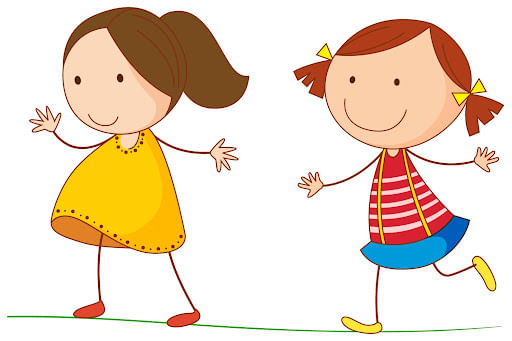Summary: बचपन | Chapter Notes For Class 6 PDF Download
सार
लेखिका ने इस पाठ में अपने बचपन के बारे में बताया है। लेखिका का जन्म पिछली शताब्दी में हुआ था। अभी लेखिका की उम्र दादी या नानी जितनी होगी। बचपन से लेकर अब तक उनके पहनावे में बहुत परिवर्तन आए। बचपन मे वह रंग बिरंगे कपड़े पहनती थीं जैसे नीला ,जामुनी, ग्रे, काला, चॉकलेटी परन्तु अब वह सफ़ेद रंग के कपड़े पहनती हैं। पहले वे फ्रॉक, निकर-वॉकर, स्कर्ट, लहँगे, गरारे पहनती थीं लेकिन अब चूड़ीदार और घेर दार कुर्ते पहनती हैं। बचपन के कुछ फ्रॉक अभी भी उन्हें याद हैं।

उन्हें अपने मोज़े और स्टॉकिंग भी याद हैं। उन्हें अपने मौजे खुद धोने पड़ते थे। हर रविवार को अपने जूतों पर पॉलिश करनी होती थी। उन्हे नए जूतें से ज़्यादा पुराने जूतें पहनना पसंद था क्योंकि नए जूतें पहने से पैरों में छाले हो जाते थे। आज भी उन्हें बूट पॉलिश करना पसन्द है। हर शानिवार को उन्हें सेहत ठीक रखने के लिए ऑलिव ऑयल या कैस्टर ऑयल पीना पड़ता था।
उन दिनों रेडियो और टेलीविज़न नहीं था। केवल कुछ घरों मे ग्रामोफ़ोन थे। लेखिका के अनुसार पहले और अब के खाने में भी अंतर आया है। पहले की कुलफ़ी आइसक्रीम हो गयी है। कचौड़ी-समोसा पैटीज़ में बदल गया है। शरबत कोक-पेप्सी बन गया है। लेखिका के घर से मॉल नजदीक था। उन्हें हफ्ते मे एक बार ही चॉकलेट खरीदने की छूट थी और सबसे ज़्यादा चॉकलेट उन्हीं के पास रहता था। उन्हें चने ज़ोर गरम और अनारदाने का चूर्ण बहुत पसंद था। लेखिका को पहले के चने ज़ोर गरम और अब वाले में अंतर नहीं लगता। उसका स्वाद वैसा ही है।
लेखिका ने अपने बचपन शिमला रिज पर बहुत मजे किए हैं। घोड़ों की सवारी भी उन्होंने की है। सूर्यास्त के समय दूर-दूर तक फैले पहाड़ मनोरम दृश्य प्रस्तुत करते। चर्च की बजती घंटियाँ को संगीत सुनकर लगता प्रभु ईश कुछ कह रहे हों। स्कैंडल पॉइंट के सामने के शोरूम में शिमला-कालका ट्रेन का मॉडल बना था। पिछली सदी हवाई जहाज़ कभी - कभी देखने को मिल जाते थे। हवाई जहाज़ देख कर ऐसा लगता था जैसे कोई भारी भरकम पक्षी पंख फैलाकर तेज़ गति से उड़ा रहा हो। गाड़ी के मॉडल वाली दुकान के साथ एक और दुकान थी, जहाँ से लेखिका ने अपना पहला चश्मा बनवाया था। वहाँ के डॉक्टर अंग्रेज़ थे।
शुरू शुरू मे चश्मा लगाना उन्हें अटपटा लगता था। डॉक्टर ने आश्वासन दिया था कुछ दिनों में उनका चश्मा उतर जाएगा परन्तु आज तक वह नहीं उतरा। इसकी जिम्मेदार लेखिका खुद हैं। वह दिन की रोशनी में नहीं पढ़कर रात में टेबल लैंप के सामने पढ़तीं। जब पहली बार उन्होंने चश्मा लगाया था तब उनके भाई उन्हें चिढाते थे कि उनकी सूरत लंगूर जैसी लग रही है। धीरे-धीरे चश्मा लेखिका से घुल-मिल गया।
कठिन शब्दों के अर्थ
• सयाना - होशियार
• शताब्दी - एक सौ साल का समय
• फ्रील - झालर
• चलन - प्रचलन में
• केस्टर ऑयल - अरंडी का तेल
• ऑलिव ऑयल - जैतून का तेल
• खुराक - निश्चित मात्रा
• मितली - उल्टियाँ
• मुँह में पानी भर आना - लालच आना
• निरा - केवल
• कमतर - कम अच्छा
• खीजना - क्रुद्ध होना
• सुभीते - सुविधाजनक
FAQs on Summary: बचपन - Chapter Notes For Class 6
| 1. What is the importance of childhood education? |  |
| 2. What are the different stages of childhood development? |  |
| 3. How can parents support their child's education at home? |  |
| 4. What are the benefits of early childhood education? |  |
| 5. How do schools accommodate different learning styles in childhood education? |  |

















